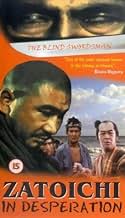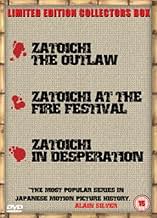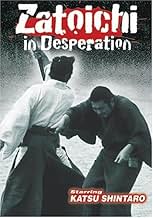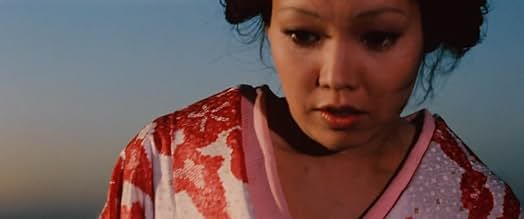IMDb-BEWERTUNG
6,8/10
1242
IHRE BEWERTUNG
Füge eine Handlung in deiner Sprache hinzuAfter accidentally causing an old lady's death, Zatoichi seeks out her daughter to atone for the tragedy, consequently getting into all sorts of trouble.After accidentally causing an old lady's death, Zatoichi seeks out her daughter to atone for the tragedy, consequently getting into all sorts of trouble.After accidentally causing an old lady's death, Zatoichi seeks out her daughter to atone for the tragedy, consequently getting into all sorts of trouble.
- Regie
- Drehbuch
- Hauptbesetzung
Empfohlene Bewertungen
Zatoichi in Desperation is the twenty-fourth entry in the Japanese franchise about the blind masseur, skilled swordsman and lowly yakuza with the strong moral compass. The film is the first to be directed by leading actor Shintaro Katsu. This movie starts in an unusual way as Zatoichi comes across an old woman who plays the shamisen. They cross a dilapidated bridge and have a short conversation. Zatoichi wants to give the old woman some money but she slips and falls to her death. Zatoichi feels responsible for the terrible accident and decides to visit the old woman's daughter who turns out to be a manipulative prostitute. The blind yakuza still wants to help and buy her freedom. In order to get the fifty ryo to buy her freedom, he goes to a gambling house where he gets in conflict with the local boss and his mob. The criminals are aware of Zatoichi's identity which is also the case for a wandering swordsman and a group of thugs who all want to earn the bounty on his head. In his search for forgiveness, the blind masseur soon has to fight off yakuza, swordsmen and criminals and has to deal with a prostitute whom he cannot trust.
There are a few interesting elements about this movie. First of all, the movie features some psychedelic flashbacks, supported with funky music that make the influence of the seventies' cultural trends quite obvious. Secondly, the locations are quite intriguing as the story takes place in a small town by the sea and shows the rough everyday life of exploited fishermen. Thirdly, Zatoichi gets severely injured in this movie and has to use a new technique to fight off his numerous enemies in a stunning fight sequence in the sandy town.
Despite these fresh elements, the film also has considerable downsides. The characters are neither fleshed out nor sympathetic which leads to the problem that one only cares about Zatoichi's fate. The plot starts interestingly but slows down and wastes a lot of time through a tedious middle section. The final duel between Zatoichi and a swordsman lasts for about ten seconds and looks ridiculous. Several parts of the movie feel rushed and the unusual shaky camera work makes it look like a low quality entry in the franchise.
Overall, Zatoichi in Desperation is among the weaker entries in the franchise. It has a few fresh ideas concerning camera work, score and special effects but the story and characters are too uninteresting to be memorable. I would only recommend this film to fans of old date. Those who aren't familiar with the blind swordsman yet should either start discovering the movies in chronological order or give Takeshi Kitano's version a chance.
There are a few interesting elements about this movie. First of all, the movie features some psychedelic flashbacks, supported with funky music that make the influence of the seventies' cultural trends quite obvious. Secondly, the locations are quite intriguing as the story takes place in a small town by the sea and shows the rough everyday life of exploited fishermen. Thirdly, Zatoichi gets severely injured in this movie and has to use a new technique to fight off his numerous enemies in a stunning fight sequence in the sandy town.
Despite these fresh elements, the film also has considerable downsides. The characters are neither fleshed out nor sympathetic which leads to the problem that one only cares about Zatoichi's fate. The plot starts interestingly but slows down and wastes a lot of time through a tedious middle section. The final duel between Zatoichi and a swordsman lasts for about ten seconds and looks ridiculous. Several parts of the movie feel rushed and the unusual shaky camera work makes it look like a low quality entry in the franchise.
Overall, Zatoichi in Desperation is among the weaker entries in the franchise. It has a few fresh ideas concerning camera work, score and special effects but the story and characters are too uninteresting to be memorable. I would only recommend this film to fans of old date. Those who aren't familiar with the blind swordsman yet should either start discovering the movies in chronological order or give Takeshi Kitano's version a chance.
Zatoichi in Desperation is the most somber and darkest Zatoichi film that I have seen in the series, both in terms of photography and plot. It's interesting that Shintaro Katsu, who plays Zatoichi, was the director. He was certainly going for a different look and style and got it. Most of the scenes are darkly lit and there is a claustrophobic feeling to the shots. The bad guys, composed of the local yakuza (gangster) mob, are meaner than usual and the body count of innocent villagers is far higher than usual. Zatoichi himself also suffers more at the hands of the evil doers than usual. This was the next to last entry (#24) in the series before the 17 year hiatus between #25 and 26. Things get back into the more typical Zatoichi style in #25. This film would have been appropriate as the last in the series. It has the feeling of "an ending". A very interesting entry, but not one of my favorites. As always, recommended for Zatoichi fans.
The following review is an extract from the book "Shintaro Katsu´s Zatoichi: Complete guide to all movies", which is now available on Amazon.
Zatoichi crosses a bridge with a woman who plays the shamisen. The old woman warns him to be careful, for the wood of the bridge has holes, and it is easy to fall if one does not pay attention. The two talk briefly, and the lady asks the blind man where he is going. "Nowhere in particular, wherever the wind takes me", replies the wandering masseur. The old woman replies that she intends to visit her daughter, who works in a geisha house called Ogiya in a nearby town. Moments after they have said goodbye, the blind man has the idea of offering some coins to the old woman, as a tip for playing the shamisen so well... The grateful woman is about to take the coins, but distracted by the surprising gift, slips, loses her balance and falls into the void... She, who had recommended to the blind man to be very careful.
Zatoichi feels guilty for the deadly accident of the poor woman. Unlike its owner, the instrument has remained on the bridge and the masseur picks it up. With the shamisen he walks towards the city of which the deceased spoke to him, to look for his daughter, the geisha, in Ogiya.
(...)
This, the 24th and penultimate, is one of the two films in the saga directed by actor Shintaro Katsu himself, who also acted as co-producer. The other, also directed by Katsu, is the last of the originals (called "Zatoichi" just like that), which was filmed many years later - in 1989 - and where you can see an already grayed and almost old Ichi.
"Zatoichi in desperation", as its title already indicates, is fraught with deep pessimism. Oppressive and dark, sad, depressing and hopeless. Tragically and emotionally brutal.
It also has an undeniable poetic undertone.
Zatoichi crosses a bridge with a woman who plays the shamisen. The old woman warns him to be careful, for the wood of the bridge has holes, and it is easy to fall if one does not pay attention. The two talk briefly, and the lady asks the blind man where he is going. "Nowhere in particular, wherever the wind takes me", replies the wandering masseur. The old woman replies that she intends to visit her daughter, who works in a geisha house called Ogiya in a nearby town. Moments after they have said goodbye, the blind man has the idea of offering some coins to the old woman, as a tip for playing the shamisen so well... The grateful woman is about to take the coins, but distracted by the surprising gift, slips, loses her balance and falls into the void... She, who had recommended to the blind man to be very careful.
Zatoichi feels guilty for the deadly accident of the poor woman. Unlike its owner, the instrument has remained on the bridge and the masseur picks it up. With the shamisen he walks towards the city of which the deceased spoke to him, to look for his daughter, the geisha, in Ogiya.
(...)
This, the 24th and penultimate, is one of the two films in the saga directed by actor Shintaro Katsu himself, who also acted as co-producer. The other, also directed by Katsu, is the last of the originals (called "Zatoichi" just like that), which was filmed many years later - in 1989 - and where you can see an already grayed and almost old Ichi.
"Zatoichi in desperation", as its title already indicates, is fraught with deep pessimism. Oppressive and dark, sad, depressing and hopeless. Tragically and emotionally brutal.
It also has an undeniable poetic undertone.
This is the best one, number 24. Ichi realizes that he is not a hero, is making everyone's lives ultimately more violent and difficult than it would have without his existence. He is physically punished for this and still dispatches 20 dudes without using his hands.
If you don't like mean people, you know, actually effective villains, this one might make your little sensitivities buzz. The moral philosophy Katsu evaluates is artful and considerate. This is a brutal, dark, and ballsy entry.
If you don't like mean people, you know, actually effective villains, this one might make your little sensitivities buzz. The moral philosophy Katsu evaluates is artful and considerate. This is a brutal, dark, and ballsy entry.
'Zatoichi In Desperation' was the 24th movie in the long running and very popular martial arts series starring Shintaro Katsu as Zatoichi the blind master swordsman and masseur. Zatoichi, for those that don't know is a ronin (a wandering samurai), very quiet and unassuming with a wry sense of humour, but an absolute killing machine when crossed! In this episode he encounters an old woman while crossing a bridge, and after a brief conversation with her, she tragically falls to her death. Upset, Zatoichi sets off to a nearby town to look for the woman's daughter Nishikigi to break the news to her. He eventually finds her working as a geisha and learns she only needs to pay a debt of fifty ryo to buy her freedom. Zatoichi becomes obsessed with raising the money and in doing so ignores the hardships experienced by the local fisherman caused by the local evil boss Mangoro. But when Mangoro kidnaps Nishikigi everything comes to a head in a brutal climax, and Zatoichi must save her and his own life. I can't claim to be any kind of Zatoichi expert, but he's a most intriguing character, and Katsu plays the role masterfully. I highly recommend 'Zatoichi In Desperation'.
Wusstest du schon
- WissenswertesOnly film in the original series directed by Zatoichi himself, Shintarô Katsu. He would go on to direct one more, Zatôichi (1989).
- Zitate
Boss Mangoro Kagiya: Please enjoy watching as Zatoichi meets his end.
- VerbindungenFollowed by Mang jian xue di zi (1973)
Top-Auswahl
Melde dich zum Bewerten an und greife auf die Watchlist für personalisierte Empfehlungen zu.
- How long is Zatoichi in Desperation?Powered by Alexa
Details
- Erscheinungsdatum
- Herkunftsland
- Sprache
- Auch bekannt als
- Zatoichi in Desperation
- Produktionsfirmen
- Weitere beteiligte Unternehmen bei IMDbPro anzeigen
- Laufzeit
- 1 Std. 35 Min.(95 min)
- Sound-Mix
- Seitenverhältnis
- 2.35 : 1
Zu dieser Seite beitragen
Bearbeitung vorschlagen oder fehlenden Inhalt hinzufügen






























